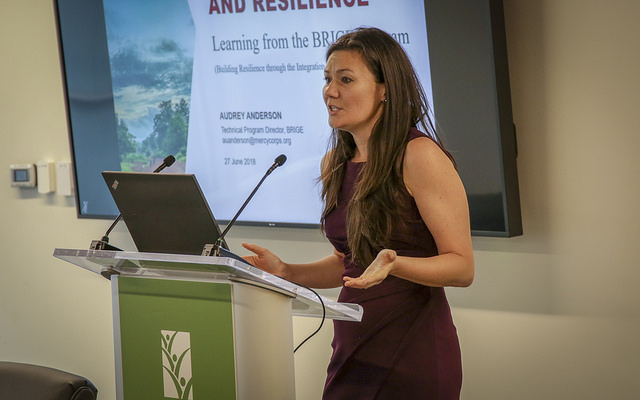While development programs today increasingly focus on promoting resilience, such efforts often hit barriers where they matter most—at the household level, where traditional gender roles can make it difficult to engage women and girls.
A June 27 IFPRI panel explored some of these barriers to resilience and techniques for overcoming them, examining programs that aim to increase gender equity in household decision making.
Tom Spangler, consortium lead for USAID’s Resilience Evaluation, Analysis and Learning (REAL) award, urged researchers to make their work relevant to people working on gender equity issues at the household level, to ensure that “findings are readily accessible by and applicable for those frontline users, and ultimately make a meaningful difference for our field colleagues and target communities.“
Within households, people have different levels of power and distinct preferences and knowledge, said IFPRI Research Analyst Sophie Theis. Women’s lack of bargaining power can result in decisions that do not reflect their interests, leading to missed opportunities for building resilience, she said, a problem that reverberates on the individual, household, and community levels. Studying men’s attitudes, the extent of information sharing within households, and women’s own decision-making aspirations can reveal important potential levers for shifting household decision-making, Theis said—noting IFPRI’s work under the GCAN project with Mercy Corps’s BRIGE program (Building Resilience through the Integration of Gender and Empowerment).
IFPRI Associate Research Fellow Greg Seymour shared insights from the project-level Women’s Empowerment in Agriculture Index (pro-WEAI), which employs survey data to help agricultural developmental projects diagnose areas of women’s disempowerment, design strategies to address deficiencies, and monitor project outcomes. Seymour showed examples of decision-making questions from the pro-WEAI survey, including questions sensitive to whether an individual wants to participate in a given decision. In this way, pro-WEAI triangulates information on multiple aspects of decision-making to better capture women’s agency.
BRIGE Technical Program Director Audrey Anderson described how Mercy Corps seeks to build equitable household decision making for resilience. In two recent Household Dialogues pilot programs in Nepal and Niger, she said, facilitators guided husbands and wives to reflect on gender norms in the household including household budgeting, workload, and disaster preparedness.
The training, combined with 6+ weeks of follow-up visits with the couples, led to noticeable change. Field staff recognized a shift within the community, and how the changes resulting from the dialogues increased the effectiveness of their own existing programs. Participants reported an increase in respect for women, women’s confidence, trust in women outside the home, and sharing of household chores. Anderson emphasized that such facilitated encounters should be integrated into existing programs to improve their efficacy, and that there are no shortcuts to shift social norms—that takes time and trust.
Yeva Avakyan, associate vice president for gender equality at Save the Children, described the work of the LAHIA Program (Livelihoods, Agriculture and Health Interventions in Action) in Niger, which took a three-pronged approach: Supporting health promoters, women’s savings and loans groups, and husbands’ schools.
Both LAHIA and Mercy Corps selected influential men and religious leaders in the community to set an example and inspire others. LAHIA husbands’ schools provided a space for men to participate in information exchange and dialogue and to address intra-household relations, maternal and child health, and reproductive health. Avakyan noted improvement in household communication and joint decision-making related to agricultural production, children’s education—especially investment in girls’ education—and delay of child marriage.
Supporting gender equality within the household is a key catalyst for resilience, and panelists agreed that to build equality, more data is needed: Systematically measuring intrahousehold dynamics would help inform the design, monitoring, and evaluation of resilience programs. As Anderson noted, the Household Dialogue “brought men into women’s worlds, and women into men’s worlds,” and through this process, couples can begin to fully leverage their combined potential for building resilience.
Grace Collord is an IFPRI Events Assistant.







